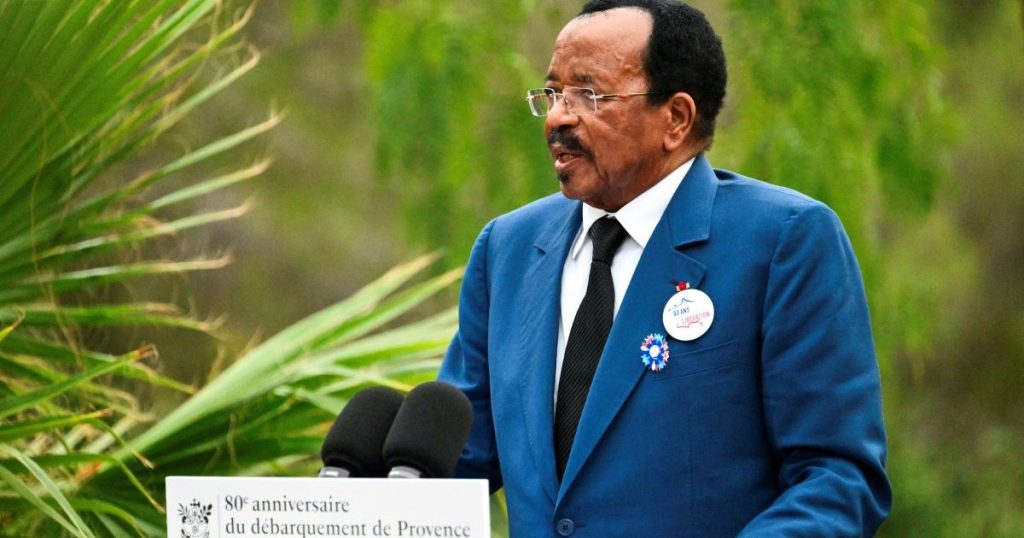On Wednesday, Cameroon marked the 42nd anniversary of President Paul Biya’s administration, an event celebrated by enthusiastic rallies, special broadcasts, and calls for him to seek an eighth term in office. At 91 years old, Biya’s tenure is one of the longest in Africa, and recently, his supporters mobilized to reaffirm their allegiance amid concerns regarding his health. This show of support comes shortly after his six-week absence from the country, which sparked widespread speculation about his well-being. Jean Nkuete, secretary general of the ruling Cameroon People’s Democratic Movement (RDPC), urged party members in a recent letter to consolidate their support behind Biya for the sake of Cameroon’s stability and progress, highlighting the president’s “fantastic record” during his long rule since taking power in 1982.
The letter from Nkuete emphasized the Cameroonian tradition of respecting elders, framing the call for another term as a testament to national values. This rhetoric resonated with party members, leading to actions from various branches across the nation. In the western region, a group of activists appealed for unity among Cameroonians regardless of political affiliation to support Biya’s candidacy. At a public screening of a documentary celebrating Biya’s presidency in Ebolowa, the Higher Education Minister echoed this sentiment, formally requesting him to stand for re-election next October. Yet, despite this burgeoning support, Biya himself has maintained his characteristic reticence on the matter, providing no public indication of his intentions for the upcoming election.
Speculation about Biya’s future has been further complicated by the political climate in Cameroon, marked by strict control over dissent and freedom of expression. Following a contentious election in 2018, Biya’s administration intensified its autocratic measures against opposing viewpoints, leading to repression and imprisonment of dissenters. Amidst these conditions, discussions regarding his potential successor remain largely taboo, with no clear indication of who might take his place should he choose not to run again. His long absence from the public eye only fueled these speculations, necessitating an unusual announcement from the government reassuring citizens of his good health and ongoing work while abroad.
Upon returning to Cameroon on October 21, Biya was warmly welcomed by his party members, with festivities marking his arrival. His return was orchestrated with notable fanfare, featuring a reception at Yaoundé airport alongside high-ranking officials including the secretary general of the presidency and his wife. Notably, his re-entry was underscored by visible signs of his age, including the availability of assistance for passengers with reduced mobility. Following his arrival, Biya resumed his presidential duties by signing military appointments and other decrees as proof to his supporters that he remains in control of the government.
In terms of public representation, the Cameroonian presidency has been showing limited visibility of Biya to the media, offering only curated images portraying him as active and engaged. State television representatives expressed confidence in his dedication to national issues, enhancing the narrative that he is still capable of wielding power effectively. Meanwhile, the presidential magazine, “Time of Opportunity,” devotes considerable space to portraying Biya’s diplomatic activities, seeking to reinforce the image of a leader who continues to fulfill his role actively, even if much of his work remains behind the scenes.
Analysts are examining the factors contributing to Biya’s enduring presence as a leader, including strategies of “absence, distance, and silence.” These elements appear to play a significant role in maintaining his grip on power across decades. Despite uncertainties regarding his health and the growing calls for a successor, Biya’s supporters show no signs of diminishing loyalty. As the nation anticipates the potential for his candidacy in the upcoming electoral cycle, the dynamics of public sentiment and political maneuvering within Cameroon will likely continue to evolve in the context of Biya’s complex legacy and the challenges ahead.














